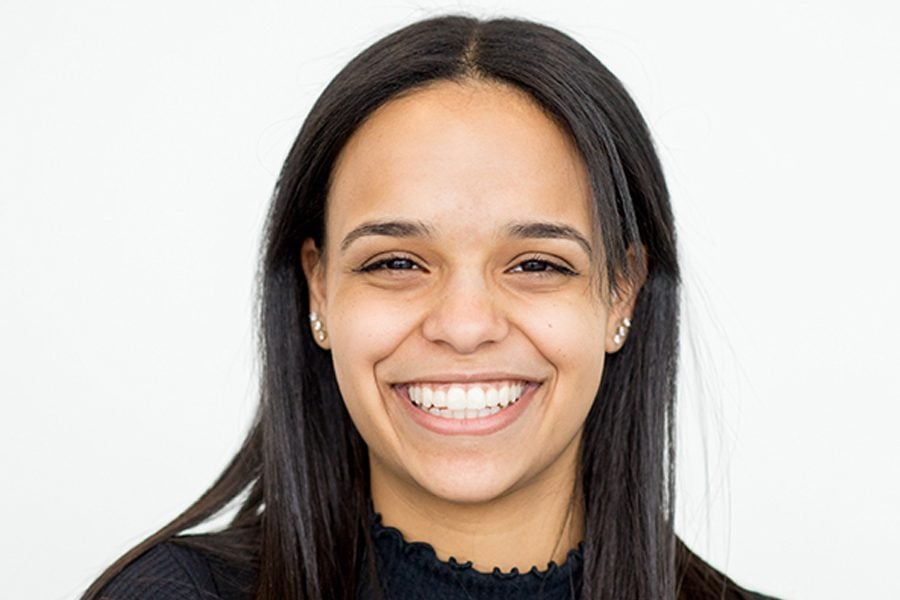Jordyn Ricard earns record ninth undergraduate research grant
Jordyn Ricard gained her ninth research grant from the Office of Undergraduate Research, a university record.
May 29, 2019
SESP junior Jordyn Ricard received a record ninth research grant from the Office of Undergraduate Research this year, earning over $25,000 in total grant funds.
Ricard began her academic career at Northwestern the summer before her freshman year as a member of the BioEXCEL program, a summer transition program focused on underrepresented students, when she was still on a pre-med track. She knew almost nothing about how to apply for research grants when she started, Ricard said, but she had the luck that the director of BioExcel also ran the Bioscientist program.
The Bioscientist Program, a program dedicated to introducing students to research, helped her secure a lab as well as funding for what would be her first of many undergraduate research grants. As a result of the program, Ricard joined three research labs and works as a research assistant in them to this day: Vijay Mittal’s ADAPT research lab, Claudia Haase’s Life-Span Development Research Lab and Miriam Sherin’s research lab.
In Haase’s lab, which studies emotions as a way to understand human development more broadly, Ricard worked with software that analyzed facial movements, but she didn’t stop there. Ricard decided to study a different technique to code facial movements by becoming a certified Facial Action Coding System coder.
Haase has worked with Ricard since 2017 and said Ricard always “thinks big” whenever she works in the lab. It had surprised her, Haase said, to learn that Ricard had undergone the FACS process, because certified coders must take up to 100 hours to study the 527-page manual.
“Imagine my surprise when one day I learned that Jordyn has started to learn FACS, despite the fact that she hadn’t been prompted by anyone in the lab, and she became the first FACS-certified coder in our lab,” Haase said. “So I was really blown away. She has now inspired other undergraduates and other graduate student to obtain their FACS licenses.“
This certification, Ricard said, will be a key skill for her senior thesis, which will focus on the role early life stress may have in giving youth a higher risk in developing psychosis. Her thesis will be some of the first work in this field to study psychosis using this human coding approach.
“Specifically, we’re looking at facial expression — people with schizophrenia or psychosis often have blunted facial expressions,” Ricard said. “Recent work in our lab has shown that you can start to see some of these alterations and facial expressivity before they actually develop schizophrenia or psychosis. So what I want to look at is if this blunting of facial expressions related to this early life stress.”
Of Ricard’s nine grants from OUR, four of them are conference research grants. These grants are given on a case-by-case basis and are awarded when a student is invited to speak at a conference.
In 2018, Ricard received a scholarship and spoke at the Annual Biomedical Research Conference for Minority Students. Being a first-generation, low-income, black woman in the research field, is like a “triple-whammy” because there’s not “a whole lot of me represented anywhere,” she said.
Last summer, Ricard worked as a research assistant at Harvard’s Suicide and Self-Injury Lab as a part of the Leadership Alliance program. While at the program, Ricard had to endure racist comments from a student volunteer from a different university.
“He said such horrific and racist things to me on a daily basis,” Ricard said. “I ended up kind of withdrawing from the lab for some amount of time … I was just too afraid of what my professor would say, I was afraid he would let me down, or he just wouldn’t care. In the end, I was completely wrong, and I wish I would have gone to him sooner, because he was so supportive.
“But it’s incidents like that, where you’re just unsure of who will have your back, and you have to deal with just the natural workload of being in this industry,” she continued.
Ricard stressed mentorship and having a team as being key factors as to how she overcame those obstacles in her life, and also as what helped guide her to pursuing more research.
Her program at Harvard, she said, is just one of many that are available to undergraduate students. Ricard cited the amount of money she received through grants as an example of how much money is available to undergraduates if they seek out financial aid.
OUR director Peter Civetta said in the past two years, his office has implemented programs that have made it easier to get research funding. One program, URG Advanced, allows for students to receive up to two summer research or annual research grants in a given years.
“Jordyn is a great example of is a student who took advantage of the resources that were being offered,” Civetta said. “She got nine grants because she’s awesome, but also because she was aware that they were there and she took advantage of them.
“I got piles of money lying around my office, right,” he continued. “Come take our money.”
As a first-generation, low-income student, Ricard, who is now a human development and psychological services major, said the funding the University has given her made this research possible for her.
Ricord said that her most meaningful research is not what she has done so far but what she is going to do in the future. She said is “by no means done” in applying for grants and doing more research. She joked that because she’s graduating next year, “maybe the record for grants won’t be too high.”
Email: austinbenavides2022@u.northwestern.edu
Twitter: @awstinbenavides
Related Stories:
– Ziegfeld Girls, Interracial Love Stories, Florida Keys: More than 200 Northwestern students receive Undergraduate Research Grant


